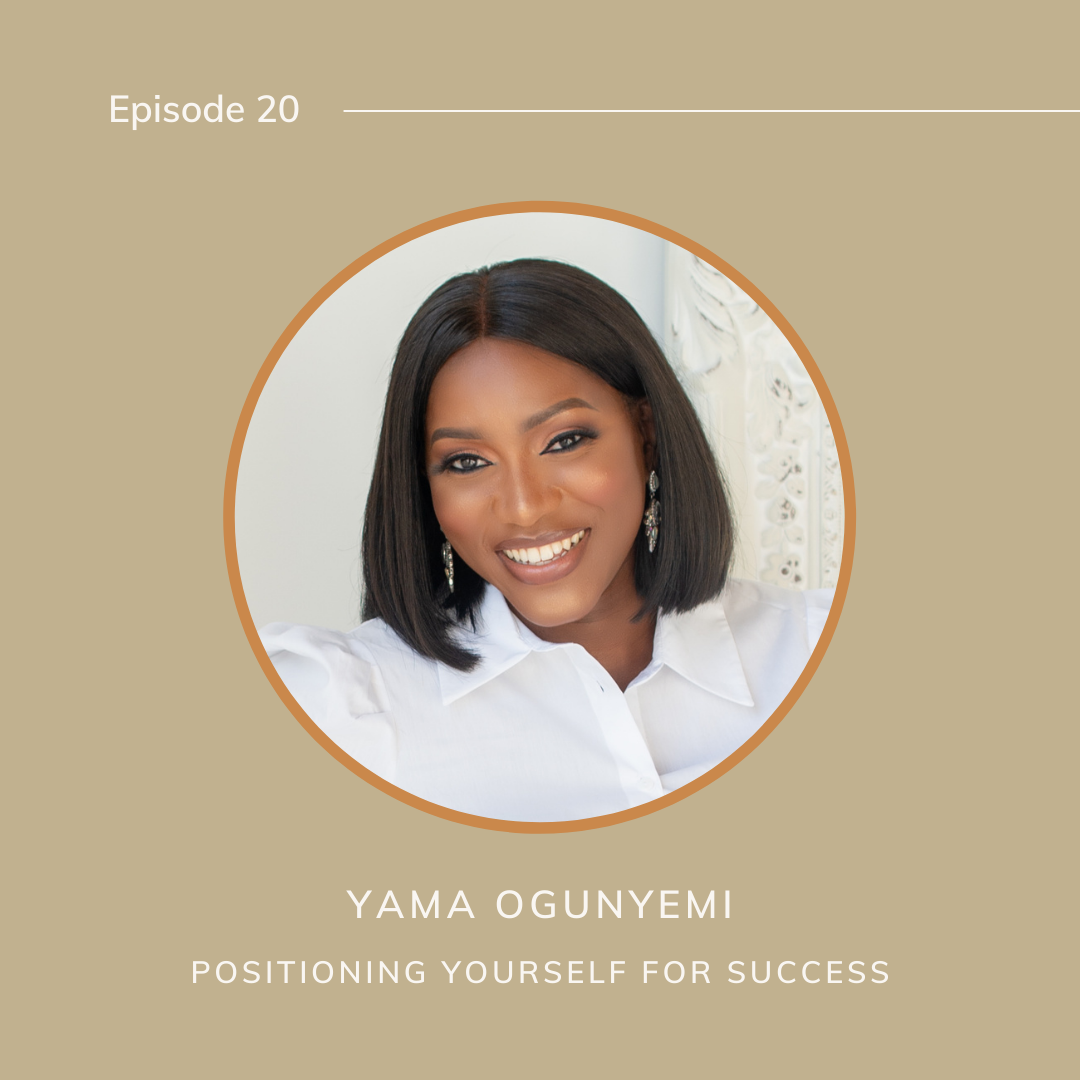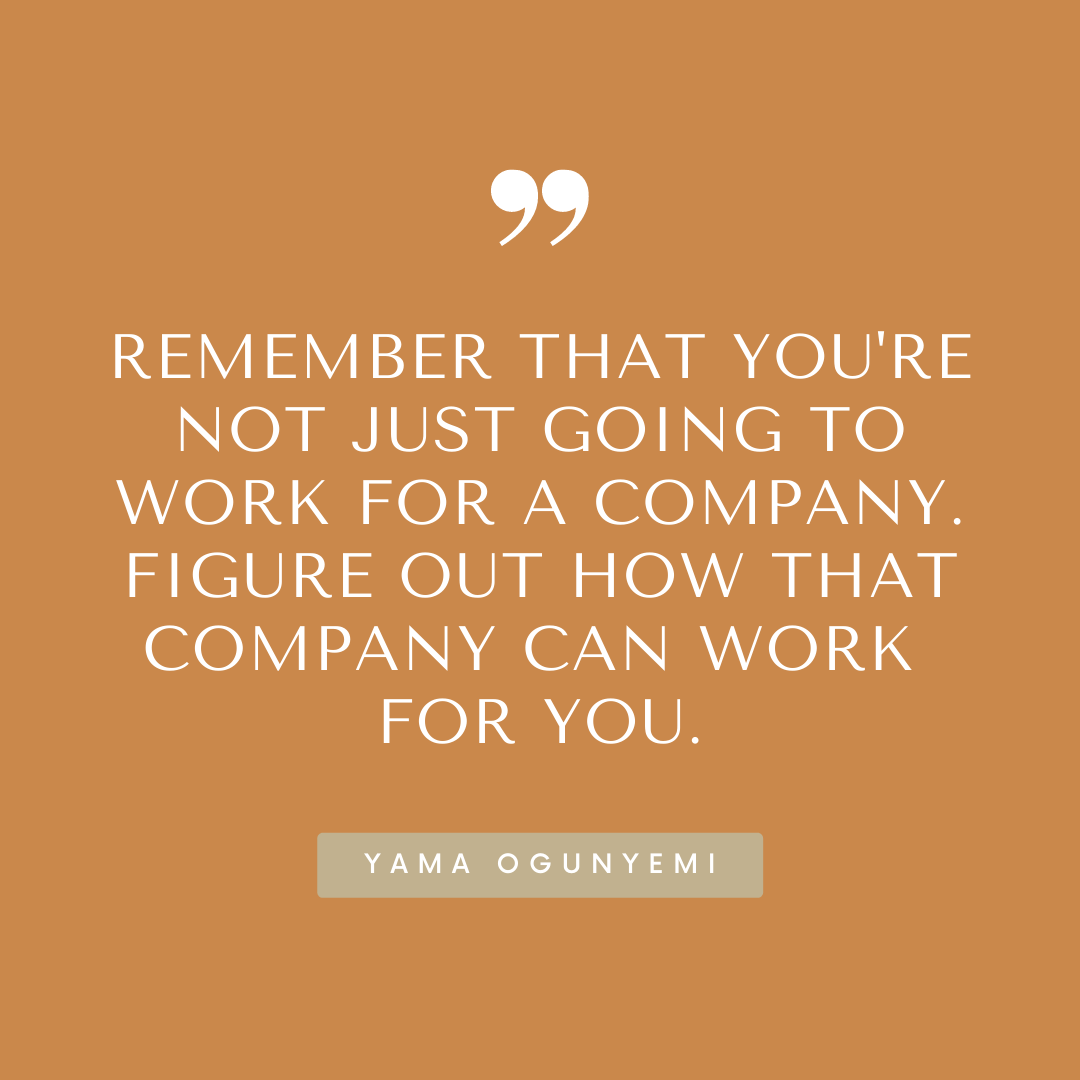Leadership & Hiring Consultant
Passion to Legacy
If you are looking to get hired in a sports position, it can be a daunting process. There are applications to fill out, companies to research, and resumes to update considering the latest trends and expectations. On the other hand, it can be just as daunting for companies looking to hire.
in this episode,
My guest, leadership and hiring consultant Yama Ogunyemi helps clear up some of the questions surrounding hiring and gives tips on how to be the best candidate, as well as find the best candidate. She gathers her years of corporate experience to support small businesses that need the strategy of a consultant and the partnership of a coach. Tune in and learn how to position yourself for success.
Landing your dream job in sports - advice from a leadership & hiring consultant
It started with a passion for sports
Yama didn’t know what she wanted to be in high school or what to major in while in college but knew it had to center around healthcare, specifically in sports.
She applied to do sports medicine in college but eventually transitioned away from sports and earned her degree in psychology. She then began working for Careerbuilder in a human relations capacity as an operations leader in talent acquisition.
Insight into both sides of employment
Her own talent in that position was immediately evident as friends and family began to come to her looking for planning, strategy, and employment advice. The work exposed her to both the job seeker and employer sides of business, and she found that she loved supporting people as they made these huge decisions.
Yama was helping job seekers with resumes and how to market themselves to employers and assisting employers in knowing what job seekers were looking for and the best way to post positions. It gave her fantastic insight into both sides of employment.
After over a decade working in corporate HR, Yama decided to step out on her own into entrepreneurship, creating her company Consult Yama. She currently teaches online business owners and entrepreneurs how to build teams through hiring and lead those teams through executive leadership trends.
Job Seekers - Do Your Research
People looking for jobs often make some big mistakes when applying for positions. Her advice: do your research. She advises to go further than the basic research of what the company does and approach it with a more critical lens. How can you market yourself to be the best person for the position? Take some time to reach out to some previous employees on LinkedIn to go deeper into the company’s culture and day-to-day needs. Don’t be afraid to be more aggressive in your research.
Is it a good fit for both sides?
She also encourages job seekers to remember that employment should be a good fit for both sides and think about what the company can offer you. Will it be a good cultural fit? One good hack she has for this is to check out the company’s pictures.
Not just the curated ones on the website but the less structured ones on Instagram. Does it look like a place you could see yourself? Think about your own personal non-negotiables. Do you need space and time for nursing as a new mom or for your specific religious requirements?
Red flags for job seekers
Some red flags for job seekers could include the company having many negative reviews and not having their values posted on their website and job posting. You also want to pay attention to the interview process.
A scattered or unorganized interview process could be a sign of how their company functions daily. You also want to see if there is diversity in the people conducting the interviews. Does it seem like they are trying to get to know you too, or do you feel like just another number?
You want to feel valued throughout the interview process, like they want you for the position. It’s challenging to feel important when you get the job if they made you feel forgotten in the interview process.
Modern hiring
Traditional hiring hasn’t always worked well in the past to hire the best employees. The way we work is so different now, and we have to find ways to accommodate that. In modern hiring, what you can do often matters more than specific experience. Employers are looking for a particular skill set in their employees. They may not want resumes but want you to show that you have the skills by submitting a video.
Things that haven’t changed
Some things haven’t changed, though. There are still things that will immediately get your submission put into the “no” pile. Typos are among the most significant indicators that stick out to hiring managers, as they show a lack of attention to detail.
The details matter in your submissions. Yama suggests that even though generic canned resumes and cover letters are more manageable, you should take the time to specialize each submission to the company. Gone are the days of “To Whom It May Concern.” Habitually canceling and rescheduling your interview appointment is another way to turn off a potential employer. Even though many interviews are being conducted online right now, you shouldn’t abuse the hiring manager’s calendar.
Trends in the interview process
There are other trends in the interview process, like group interviews, panel interviews, and series interviews, which might include a phone call, an in-person interview, and some sort of assignment. The type of interview often varies with the type of position. Virtual positions usually have more of the assignment and assessment submissions, but an in-person position may require you to come in to shadow someone for the day.
No matter how the interview is conducted, set yourself up for an excellent first impression. There are so many other qualified candidates, and you need to sell who you really are to get in the door.
Be creative and innovative. The best way to get in the door anywhere is to show people how they’re losing money. Show how it is impacting their bottom line by not having the position filled. If you have a good case study, even better.
The process doesn’t end when you are hired either. Yama’s advice is to make sure you have open communication and be part of the team when you are onboarded. Set it up for the way you want things to go for the duration and tell people how you like to work. Are you more autonomous, or do you like to receive constant communication?
Explain how you work and try to understand how others work, especially your managers. Learn their goals, and in that way, you position yourself for the long term. If you want to climb the ladder for an eventual position in leadership, discuss that in your initial one-on-one with your leaders and at your 30/60/90 check-ins.
Flipside - Hiring Managers
On the other hand, managers looking to hire have a lot of considerations also. Yama’s best advice for hiring managers is not to rush the hiring process. You don’t want just to pick someone to get someone in, but take your time to find the right person.
Hire with a goal in mind and create an end-to-end strategy of the process from application through onboarding.
Hiring managers should begin by asking questions: What is the focus of the role? What hard and soft skills will the candidate need? How will I screen and filter candidates? What does the interview process look like? What questions will be asked, and will they be value-based or scenario questions? What are the key competencies for the role? What is the definition of success for the role?
The goal is retention
The goal for hiring is retention, so narrowing down the search and finding the right person is critical. Hiring managers should create a system that will weed out people who aren’t qualified with a screener containing some make-or-break questions.
If you are looking for someone with a degree or five years of experience, go ahead and screen everyone else out. Bring it down to a shortlist. After that rough downsize, ask more specific qualifying screener questions or assessments to drill down farther.
Automation is key
For this screening process, Yama says automation is key. The screeners will help you whittle down the list using keywords or scoring. If you use the right software and platform to help you, you can hone in to help you find the right person. You can also automate letters that can go to people to move them to the next stage or thank them for applying.
The onboarding process
Again, the hiring process continues through onboarding. Most new employees will leave at the initial stage if they realize they are not appropriately onboarded. Take the time to help new employees feel welcome and competent.
Give them a schedule, so they understand their day-to-day expectations. Have a complete training program for when they come in, so they have something to do. Give role expectations and have a 30/60/90 day plan in place so they know what to expect through their first quarter in your business.
Successfully onboarding someone will help retain them because they feel you are invested in training and developing them.
In this episode, we cover:
How to position yourself as a stand-out job applicant
The best way to use connections and your network to find a position
How hiring managers can attract and hire the best employees
RESOURCES AND LINKS MENTIONED IN THIS EPISODE:
Connect with Yama on social media @consultyama
Visit www.consultyama.com
CONNECT WITH ME ON:
LinkedIn - Emma Vertolli
Twitter - emm_vert
Instagram - @itsemmavert
MORE ABOUT THE PASSION TO LEGACY PODCAST:
Passion To Legacy allows listeners to get a true behind-the-scenes look at the various careers inside the sports industry; even as detailed as the day-to-day duties and operations. Learn what it takes to land your dream role. Gain clarity on what your future career could be. Take action and kick start your humanitarian spirit.
Emma Vertolli is a marketing strategist whose career has centered around growing and nurturing communities. Early on in her professional career she felt stagnant, unfulfilled, and in search for more. She dove into sports business courses, books, & networking. To her surprise, she learned that if you want to break into the sports industry AND accelerate your career, it all comes down to who you know. There was a trend that kept coming up: people need to learn how to network & people need a space to be able to do so.
In Passion To Legacy, Emma shares impactful conversations with professionals working behind the scenes in the sports industry. The bases are loaded in this podcast, we’re chatting all about career goals, hurdles & charity. So grab a pen and pull up a seat - you’re going to want to take notes!
As a listener, you can expect to:
- Gain motivation and inspiration for pursuing your dreams
- Get an insider's perspective into what it’s like working in the sports industry
- Gain insight for getting involved in charitable work
- Learn networking tips for landing a role in the sports industry
- Plus much more!
Pro tip: new episodes drop every Tuesday & Thursday. Be sure to subscribe so you don't miss a session!






